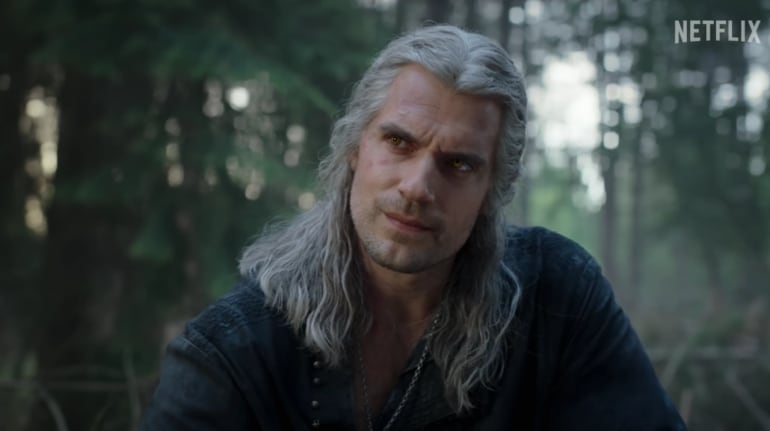



“Neutrality has its consequences,” Jaskier tells Geralt, in an episode from the third season of Netflix’s unlikely global hit, The Witcher. A story about a gruff centrist who goes about a medieval landscape introspectively groaning and elaborately culling monsters for gain, somehow become a popular franchise. All without a throne, worthy of the battle that most medieval epics eventually hark back to. Henry Cavill, as the unsentimental but secretly soft Geralt of Rivea became a revelation because in a show about modest moving parts, he remained steadfast, as unanimated anchor who allows the world around him, to come to him. Unlike the sprawling Game of Thrones and the Rings of Power reboot, The Witcher instead became about a small family of misfits banding around a man who, though apolitical himself, eventually becomes the foil for the politics of family. It’s the age-old story of a reluctant father figure, but in The Witcher, it also took on wicked, deliriously creative forms. That format, of a multi-dimensional voyage, junked for most of the second season, returns in the third.
The third season begins with Geralt, Yennefer and Ciri, having escaped the fallouts of last season’s battles in a faraway home. This is the first time we’ve seen Geralt live a life of contemplative manhood. Here, he chops wood, makes his unremarkable home and has supper with a rag-tag family that is more a consequence of circumstance than design. Geralt’s romance with Yennefer continues to be awkward and is therefore mined for humour. Ciri has begun to accept the eventuality that her seismic powers are likely to also circle her as a potential together. Elves, monsters, draconian slumlords, and her own father trained their eyes on her in the second season, and in the third, these stakes have only been elevated. Only this time, it’s more of a storied journey, a marathon through tasks, contrivances, betrayals and more. Precisely the template, the edgy travelogue, that has made Geralt’s adventures so fascinating to follow.
The eerie territory of family life, a moment of pause, that also includes a predictably tasty reunion with Jaskier, is quickly sidestepped for the many conflicts that the world outside will continue to bring to the family’s doorstep. It’s a fight that Geralt is keen on quitting, but can’t help fight nonetheless. Thankfully, the show returns to the gory, at times sexy template of the first season that had gone missing for a broody second. Cavill is back to slaying multi-legged monsters, seeking mysterious dames and rescuing people who aren’t what they seem. The Witcher’s stomach for installing mystery in the macroeconomics of the series, has sustained its broader whimsy. You don’t remember the fiends, the folksy exaggerations but you can’t get enough of everything our protagonist cannot see coming.
The supporting cast of the show, that now risks becoming too vast for its own good, has also grown in prominence. Ciri, Yennefer and Jaskier, as the bandits supporting Geralt’s macho-man act are allowed to grow further in a third season that firmly settles into the tempo of a family taking this stand together. It cleverly splits the four, send them on a quest each, to also touch upon the political churn of a realm that though it tries hard to suggest collapse, rarely feels like so.
In fact, it might just be The Witcher’s greatest flaw, its inability to comprehensively spell out the politics of the ‘Continent’. For a place that also sounds like a placeholder, the wider conflict of a landscape, its surrealistic bits notwithstanding, has rarely managed to impose itself on the show’s arterial pathways. In fact, the second season that spent plenty of time drawing this map of overarching conflict between giant armies, feels like a burden the show must carry as opposed to one it would like to flaunt. You’d instead just want to see Geralt uncover mysteries, fight monsters, and groan some more. More of the folksy version, if you like, as opposed to the contemporary, woke one.
Cavill’s high-profile exit from the series, which makes this season his last (he will be replaced by Liam Hemsworth) makes season 3 a bittersweet event. The actor has literally and metaphorically, killed as the witcher, a rare case of adapting literary material where a single casting choice, has practically elevated the material. Cavill is a magnetic presence, a full-bodied man who has perhaps transported the unsentimental action hero stereotype, to a medieval place.
The Witcher never gets as gory as Game of Thrones, or as visually flamboyant as the Rings of Power, but its ability to meld self-deprecating fun and coarse language, with monsters, murder and just about a tasteful amount of sex and sleaze, places it right in the middle.
Ironically, as centrist as Geralt thinks he is. It’s however a format that Cavill’s seductive grey mane, his signature groans have hoisted to a position from where his sword-wielding version of the crusader feels far more fitting for a man who has also played, to comparatively lesser effect, an iconic futuristic superhero – Superman.
Discover the latest Business News, Sensex, and Nifty updates. Obtain Personal Finance insights, tax queries, and expert opinions on Moneycontrol or download the Moneycontrol App to stay updated!
Find the best of Al News in one place, specially curated for you every weekend.
Stay on top of the latest tech trends and biggest startup news.